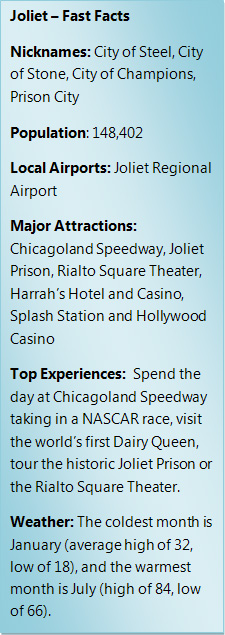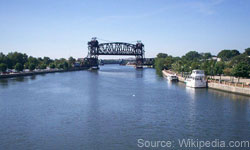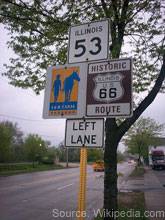 Located roughly 40 miles southwest of Chicago and within an hour's distance from the Windy City by car or commuter rail, Joliet is most often nicknamed the "City of Steel" or "City of Stones" and also as the "City of Champions." The steel industry is also a large part of the area, with Joliet being the birthplace of barbed wire.
Located roughly 40 miles southwest of Chicago and within an hour's distance from the Windy City by car or commuter rail, Joliet is most often nicknamed the "City of Steel" or "City of Stones" and also as the "City of Champions." The steel industry is also a large part of the area, with Joliet being the birthplace of barbed wire.
The city of Joliet is the fourth most populated in the state of Illinois and is also its fastest growing city. It became the seat of Will County in 1886 after being a part of Cook County when it was originally founded in the 1850s. Although the city has fallen on some hard times in the past, it is in the midst of a recent resurgence, thanks in part to its proximity to the Chicago metropolitan area.
This guide will provide you with some helpful tips and information on just about everything you need to know if you're going to be making the move to Joliet. From the city's neighborhoods and school systems to the employment options and recreational activities available within the city, you'll find it all in this guide so that you can go into your move with the knowledge that is needed to make sure everything goes as smoothly as possible.
Joliet Climate
Cold winters and warm summers characterize the humid continental climate of Joliet. Minor fluctuations in temperature, humidity, cloudiness, and wind direction are observed habitually. The spring and fall seasons feature comfortably warm sunny days and a crisp breeze, and are considered a pleasant time to visit Joliet.
The weather in the city is typical of most Midwest cities in this region, and is also influenced by nearby Lake Michigan, which lies to the east of the city and which moderates the temperature and boosts the snowfall for the city significantly during the winter months.
Joliet Neighborhoods
 Joliet has traditionally been divided into two distinct "east" and "west" sides by the Des Plaines River, which runs directly through the city. In the latter portion of the last century, the town has been expanding westward past the river and many businesses have also chosen to relocate from the downtown area to other areas west of the river. New strip malls and shopping centers were built on the west side, causing the decline of the downtown shopping center, a decline that the city is still trying to recover from today.
Joliet has traditionally been divided into two distinct "east" and "west" sides by the Des Plaines River, which runs directly through the city. In the latter portion of the last century, the town has been expanding westward past the river and many businesses have also chosen to relocate from the downtown area to other areas west of the river. New strip malls and shopping centers were built on the west side, causing the decline of the downtown shopping center, a decline that the city is still trying to recover from today.
Because of this rapid expansion to the west of the Des Plaines River, the geography of the town's distinct neighborhoods was slightly altered, with the new areas of expansion being designated as "far west" and the area closest to the river now being referred to as "Central Joliet."
Living Costs in the City
Living costs in the city of Joliet are roughly on par with other similar cities throughout the state, and the median family income is $70,215. The median home price for real estate in the city is $145,000, well below the national average as well.
The city experienced a disastrous economic downturn during the 1980s when unemployment was at an unprecedented 85 percent and the downtown area became a ghost town. However, the downtown area has been revitalized in recent years, and while the city is still mostly dependent on its manufacturing industries, there are entirely new industries popping up in the city which have been helping to fuel its revitalization process.
However, when compared to the national average job growth of24.63%, Joliet's job market has been undergoing a major resurgence, thanks to the increase in jobs created by the city's westward expansion, which in turn has created new strip malls and shopping centers. The fact that the city is only a short distance from Chicago has also helped local businesses pull through the economic downturn of the past decade, and the city is recovering well. With a job growth rate of 34.96%, now may be the perfect time to find employment in Joliet if you're planning on moving here.
Registering Your Car
Upon your arrival in Illinois after moving to the state permanently, you have a total of 30 days to update your registration and have your vehicle registered in the state before you may be required to pay a penalty.
An Illinois Driver's License can be obtained at any Illinois DMV location. The state requires new Illinois residents to update their license from their previous state to an Illinois driver's license within 90 days of moving. If you fail to update your driver's license within this 90-day window, you may have to pay a fine. Also, there is a $10 fee to update your driver's license.
Joliet Moving Resources
 Moving and storage companies are ready and willing to help you with your move to Joliet, whether you're moving from out of state or from another county in Illinois. Make sure you get estimates from multiple moving services before you commit to hiring any (at least three estimates). Check back to our guides for tips on how to choose your moving service wisely with important questions to ask, differentiating between types of estimates, and mistakes to avoid. Visit the following pages at Movers.com to get quotes for the following services:
Moving and storage companies are ready and willing to help you with your move to Joliet, whether you're moving from out of state or from another county in Illinois. Make sure you get estimates from multiple moving services before you commit to hiring any (at least three estimates). Check back to our guides for tips on how to choose your moving service wisely with important questions to ask, differentiating between types of estimates, and mistakes to avoid. Visit the following pages at Movers.com to get quotes for the following services:
Joliet Schools
Joliet is home to a number of colleges and universities, as well as several public school districts. The districts that serve the residents of Joliet are the Joliet Township High School District 204, the Plainfield Community Consolidated School District 202, the Oswego Community Unit School District 308, and the Minooka Community High School District 111. These districts are comprised of three public high schools - Joliet Central High School, Joliet West High School and Plainfield South High School - in addition to the Joliet Catholic Academy and the Ridgewood Baptist Academy.
Some of the colleges and universities with campuses that are located in Joliet are Joliet Junior College, which has the distinction of being the first public community college in the nation, the University of St. Francis, Rasmussen College and Lewis University.
Joliet Employment
Joliet offers full 10-year property tax abatement and other incentives to attract new businesses and industries. The city thrives on the diversity of its industrial base. What was once a city that relied on its manufacturing industries to survive, has since undergone a major transformation in recent years, and has greatly diversified its local economy to include many new business and retailers.
With the westward expansion of the city beyond the Des Plaines River, employment has taken a dramatic upturn, with unemployment numbers drastically recovering from high numbers in the 1980s to more average figures now. The job growth rate remains steady throughout the city, as well as in neighboring cities and counties such as Cook and DuPage Counties. Major employers include Caterpillar, Provena-St. Joseph's, Harrah's, Silver Cross Hospital, ComEd, Exxon Mobil Oil, Nicor, and AT&T.
Public Transportation
Joliet has a good transportation system and was an important port between Illinois and Michigan Canal. Joliet is also served by a number of major highways that include - Interstate 80 and 55, U.S. Route 6, 30, 52 and 66, and also by Joliet Regional Airport.
As for public transportation, Union Station in Joliet is the last stop on several different Metra lines, running from the city of Chicago down to Joliet on the Heritage Corridor route from Chicago Union Station, the Rock Island District route from La Salle Street Station, and the STAR line from O'Hare International Airport. Also, the PACE bus system provides the city of Joliet with local bus service six days out of the week and has buses that depart from the terminal in downtown Joliet each hour. The Texas Eagle line on Amtrak also runs through Joliet on its way to San Antonio, Texas from Chicago.
Culture and Contemporary Life
There are plenty of fun and interesting things to keep you busy no matter what time of year it is in Joliet. If you're a golf aficionado, then you'll be pleased to know that the city has four golf courses - Inwood Golf Course, Woodruff Golf Course, Wedgewood Golf Course and Joliet Country Club. For summer fun, there is a water park called Splash Station located within the city, and the outdoorsy types will love Pilcher State Park, a 640-acre nature preserve that features abundant wildlife and is one of the oldest parks in the city. There are also several biking and hiking trails that run throughout the city, including the Rock Run and the Joliet Junction Trails.
Other local landmarks and points of interest include the Joliet Prison, which has been featured in the FOX series Prison Break as well as the movie Blues Brothers. You'll also find the Chicagoland Speedway located in the city, as well as the Route 66 Raceway and the Route 66 Visitors Center. If you want to try your luck at a little gambling, look no further than Harrah's Hotel and Casino in the downtown Joliet area, or the Hollywood Casino in Channahon. Fun fact: Joliet is the only city in the entire state of Illinois to have two casinos.
Moving to Joliet
Whatever your reasons for moving to Joliet, whether it be for a change of scenery or for employment, the city beckons you with its charm. The first step in the process of moving to Joliet is choosing a moving company after first checking their BBB ratings, insurance and license. The moving rates are charged by the hour if you are moving within the state boundary, while for a long distance move the charges will depend on the total weight or volume in cubic feet of your belongings. In the latter case, you can ask about a flat rate or any special discounts that are available with the mover.